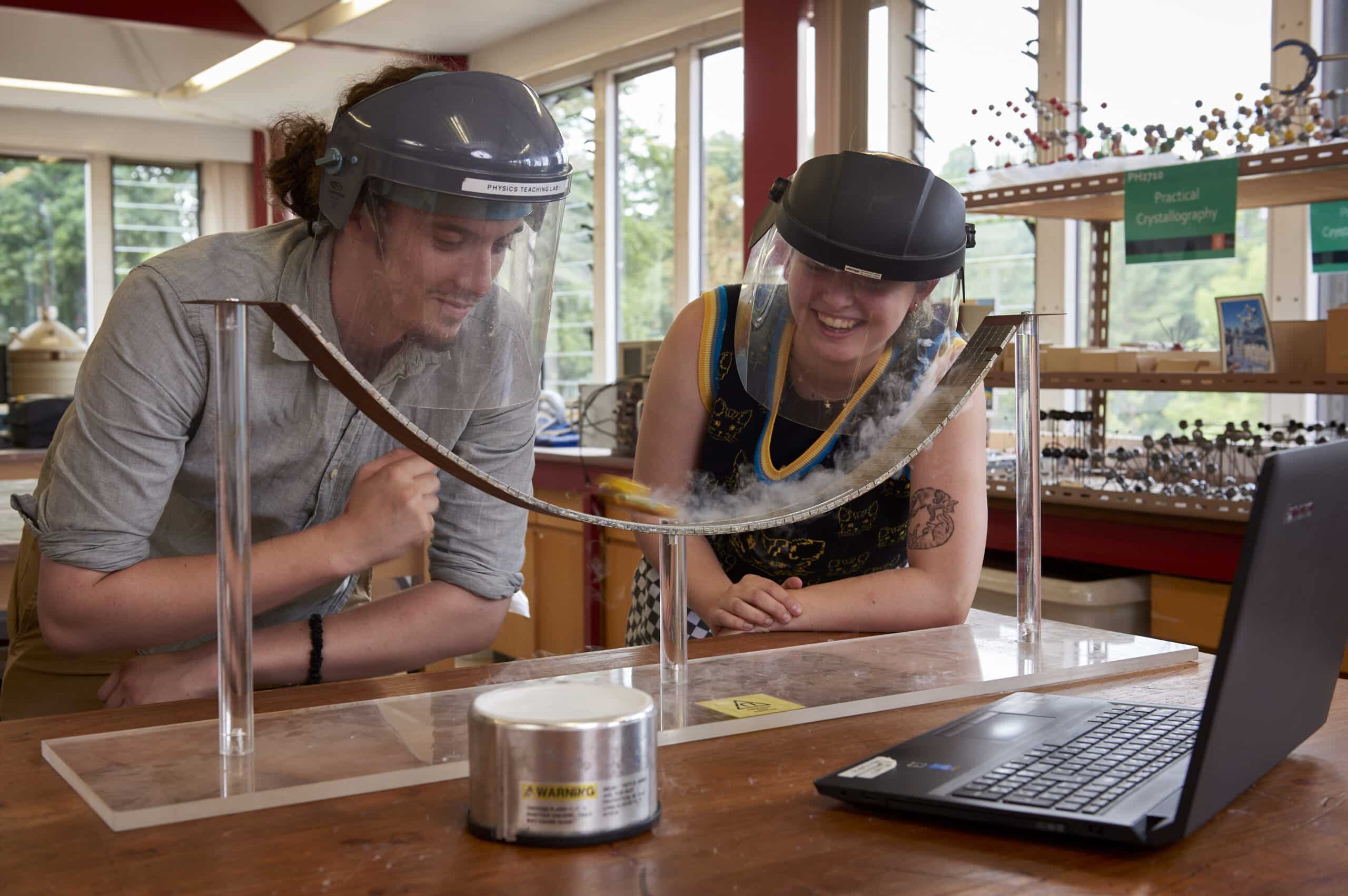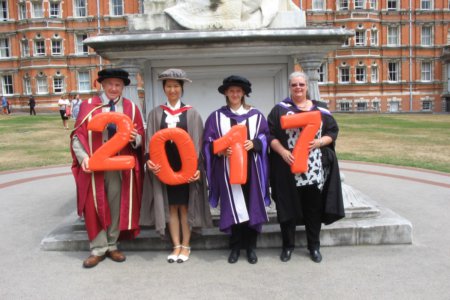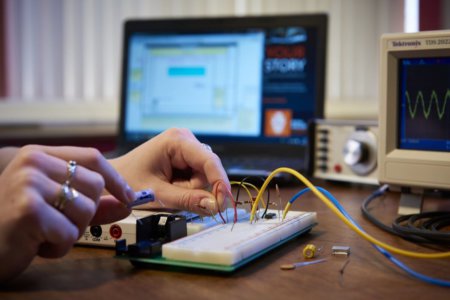Zoom in on Egham, Surrey — a town in the South East of England, on the outskirts of London, with breathtaking sights — and you’ll discover Royal Holloway, University of London. This is where you’ll find the place to be for aspiring physicists — the Department of Physics, one of the major centres for Physics teaching and research at Royal Holloway.
Here, you’ll learn from some of the best minds in the field. They bring years of experience and a wide range of expertise — from the fundamental studies of the basic properties of matter (at the lowest temperatures and highest energies) to advanced applications of physics.
The department is ranked second in the UK for graduate careers (The Complete University Guide 2024) and has a 100% world-leading or internationally excellent research environment (REF, 2021). The REF is the UK’s system for assessing the quality of research in UK higher education institutions. What’s more, 94% of students say their programmes are intellectually stimulating (National Student Survey, 2023).
Just ask Andrey Abramov. “The teaching is excellent; the staff are very knowledgeable,” he says. “I was here for seven and a half years and enjoyed every minute of it. It’s definitely the place to be, and I’m happy to recommend Royal Holloway to anyone”
There are good reasons why students love their time here. Class sizes are small. Your personal development is a priority. The department addresses equal opportunity issues, particularly the under-representation of women in Physics, as evidenced by their Silver Athena SWAN award. Strong links with other University of London Physics departments, participation in the South East Physics Network (SEPnet), and a Champion status in the Institute of Physics Project Juno further contribute to a vibrant research and learning environment.
Among the undergraduate programmes offered here are Physics, Astrophysics, Physics with Particle Physics, and Theoretical Physics. All programmes are accredited by the Institute of Physics and available as a three-year BSc or a four-year integrated master’s.
Take the Physics BSc, for example. This three-year programme equips you with the foundational knowledge expected of a graduate physicist, covering areas like quantum mechanics, electromagnetism, and Einstein’s relativity. You’ll develop a strong understanding of these core concepts and hone your mathematical and experimental skills. Courses like “Physics of the Universe” will transport you from special relativity to the mysteries of quantum mechanics, while “Scientific Computing Skills” equips you with a formal introduction to scientific computing skills, the foundation for many future careers. This structured approach ensures you gain a well-rounded understanding before venturing into advanced topics and research projects in the final year.
Whichever programme you choose, you’ll learn in small groups. Weekly tutorials with specialist researchers in the first two years provide a platform for in-depth discussions, problem-solving, and conceptual development. In the final year, students engage in a research project, immersing themselves in one of the university’s world-class research groups. Opportunities for paid research and industrial internships further enhance your practical know-how and career readiness.
“These small class sizes mean you get a lot of one-to-one help,” says the student. “We have three students and one academic staff member in tutorial sessions. There’s also an open-door policy, so you can go to their offices and ask some questions about the problem.”

Undergraduate students learn from subject experts and can join their research groups. Source: Royal Holloway, University of London
World-class facilities support your learning. The London Low-Temperature Laboratory, the SuperFab nanofabrication facility, and access to the National Physical Laboratory provide cutting-edge tools and spaces for your exploration. These are complemented by dedicated teaching laboratories, an astrodome, as well as personalised support from tutors, employability officers, and outreach programmes.
Undergraduate research is an integral part of the programmes. Whether it’s a one-semester BSc project or a two-semester MSci “major project,” you’ll have the opportunity to join the research groups and contribute to groundbreaking projects. From fundamental properties of matter to exploring the depths of the cosmos, research conducted within the department contributes to advancements in physics and beyond.
Collaborations with major international facilities and industry partners provide students with unparalleled hands-on research experiences and professional development opportunities. Students can explore the properties of matter at the UK’s national synchrotron science facility Diamond Light Source, analyse astronomical data from LIGO gravitational wave detectors or supernova explosions from the Hubble and James Webb Space Telescope, or search for new physics at the Large Hadron Collider.
“Having access to amazing facilities like the telescope has helped me to develop many skills and gives a real insight into what we learned in lectures,” says BSc Astrophysics graduate .
Paid summer placements are available through SEPnet. These allow you to gain hand-on experience with possible future employers, try out research avenues, and build your network within the scientific community. Many of student go on to find employment in their summer placements. SEPnet placements for Royal Holloway students have included National Physical Laboratory, Culham, Amec Foster Wheeler, Ultra Intelligence & Communications, and more. There’s always support by the department’s Employability Officer, who organises CV workshops, employer talks, and graduate events, among others.
Lucy Ladyman’s placement was with the National Physics Laboratory. Here, she worked with low-temperature systems and nanodevices, carried out electrical measurements, and performed the required analysis of the resulting data. “It’s great for employers to see I have practical experience in a professional capacity, especially in a national research facility,” she says.
Follow Royal Holloway, University of London on Facebook, X, YouTube, LinkedIn, Instagram, and TikTok












